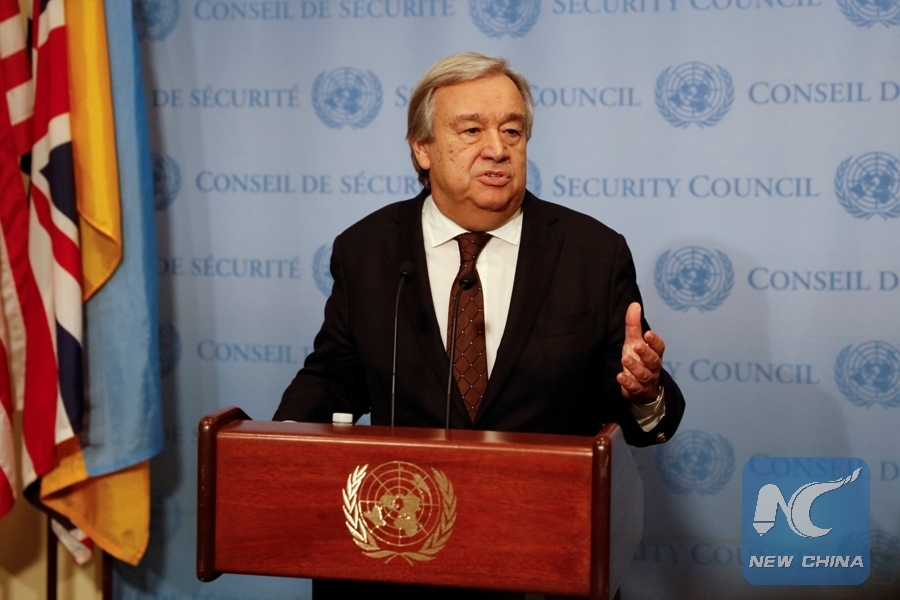
United Nations Secretary-General Antonio Guterres speaks to journalists at the UN headquarters in New York, Feb. 1, 2017. (Xinhua/Li Muzi)
UNITED NATIONS, Feb. 7 (Xinhua) -- UN Secretary-General Antonio Guterres on Tuesday said that he "deeply regrets" that Israel adopted a bill late Monday that would retroactively legalize Jewish settlements on privately owned Palestinian land.
He stressed that "the bill is in contravention of international law and will have far reaching legal consequences for Israel."
The secretary-general deeply regrets the adoption of the so called "Regularisation bill" on 6 February by the Knesset -- the Israeli legislature, UN spokesman Stephane Dujarric said at a daily news briefing here.
The spokesman added that "it reportedly provides immunity to settlements and outposts in the occupied West Bank that were built on privately-owned Palestinian land."
"The secretary-general insists on the need to avoid any actions that would derail the two-state solution," which is widely backed by the international community to bring lasting peace between the Israelis and Palestinians, the spokesman said while reading a prepared statement.
He said "all core issues should be resolved between the parties through direct negotiations on the basis of relevant Security Council resolutions and mutual agreements."
"The United Nations stands ready to support this process," the statement said.
The United Nations is part of the Middle East Quartet, which also groups Russia, the European Union and the United States in search of the two-state solution, which means a secure Israel to live in peace with an independent State of Palestine.
In answer to a reporter's question on the Knesset bill being subject to judicial review and that it could be ruled unconstitutional, Dujarric responded, "obviously, we will look at the process as it moves forward and felt it was important to express our opinion now."
Just hours before the Israeli adoption of the bill on Monday, the UN Middle East envoy expressed his concern about the scheduled vote by the Israeli legislative body.
"I am concerned by the scheduled vote on the so-called 'Regularisation Bill' as it would enable the continued use of privately-owned Palestinian land for Israeli settlements in the occupied West Bank," the UN special coordinator for the Middle East Peace Process, Nickolay Mladenov, said in a statement.
The Israeli bill would legalize about 4,000 homes in unauthorized outposts across the West Bank -- many consisting of little more than rusting mobile homes hastily towed to the sites -- that were built on land privately owned by Palestinians, and offers the landowners compensation.
The State of Israel would seize the lands, offering compensations or alternative land to the landowners, even if they do not agree to waive their property.
Israeli Prime Minister Benjamin Netanyahu was under heavy pressure from his ultra-nationalist coalition partners to bring the bill to vote following last week's court order demolition of the illegal outpost of Amona.
The evacuation triggered anger among the settlers. These outposts were erected by ultra-right settlers without permits from the Israeli authorities but the governments often have turned a blind eye to their construction.
There are additional 120 settlements that Israel considered as legal.
Both outposts and settlements are illegal under international law as they were built on lands occupied by Israel in the 1967 Mideast War, where the Palestinians wish to build their future state.

